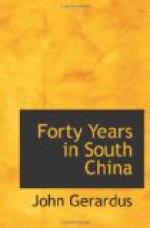of church officers. He voted with us and our
church members. He united with us in setting apart
the officers-elect to their respective offices, and
since then has usually united with us in our deliberations
in our consistorial meetings. Surely in this matter
we have acted according to the leadings of Providence
and the spirit and instructions of the Gospel of Christ;
for in Christ Jesus there is no distinction of nationalities.
Our labors having thus far been so intermingled and
our churches so intimately related and united together,
we can see no sufficient reason for separation.
If there be any advantage in the association of churches
by the organization of Classes or Presbyteries, why
should we deprive these churches in their infancy and
weakness of this advantage? We have always taught
our people to study the Word of God and make it their
rule. Can we give them a sufficient reason for
such separation? Doubtless if we were to tell
them, that the churches by which we are sent out and
sustained desire separate organizations, and therefore
should recommend such organizations to them, they would
acquiesce. They know that they cannot stand alone.
Gratitude, also, and ardent affection for those churches
by whose liberality they have been made acquainted
with the Gospel, would lead them to do all in their
power to please those churches. We can hardly
suppose, however, that such separation would accord
with their judgment, or with those Christian feelings
which they have always exercised towards each other
as members of the same Church. But we do not
suppose that either our Church or the English Presbyterian
Church will recommend such a separation. The Dutch
Church in North America has always manifested an enlarged
Christian spirit, and therefore we cannot doubt but
that she will approve of an organization by which the
churches here, which are one in doctrine and one in
spirit, may also be one in ecclesiastical matters.
Neither do we doubt but that the English Presbyterian
Church will also approve of the same course. We
do not know as much of that Church as we hope to know
in the future. Yet we know enough of her already
to love her. But if separation must come, let
not our Church bear the responsibility.
“Another question of importance may arise.
What shall be our relation as individuals to the Dutch
Church in America? We see no reason and desire
not to change the relation we have always sustained.
We were set apart by that Church to do the work of
evangelists. This is the work in which we still
wish to be engaged. We must preach the Gospel.
As God gives success to our labors we must organize
churches, and take oversight of them as long as they
need that oversight. When we find suitable men,
we must ’ordain elders in every city.’
Such is the commission we hold from our Church, and
from the great Head of the Church. Theoretically,
difficulties may be suggested. Practically, with
the principles on which we have thus far acted, we
see no serious difficulties in our way. We must
seek for Divine guidance, take the Scriptures for
our rule, and follow the leadings of Providence.
We are all liable to err. But with these principles,
assisted by your counsels, and especially by your
prayers, we have reason to believe, and do believe,
that the Spirit of truth will guide us in the way
of truth.”




